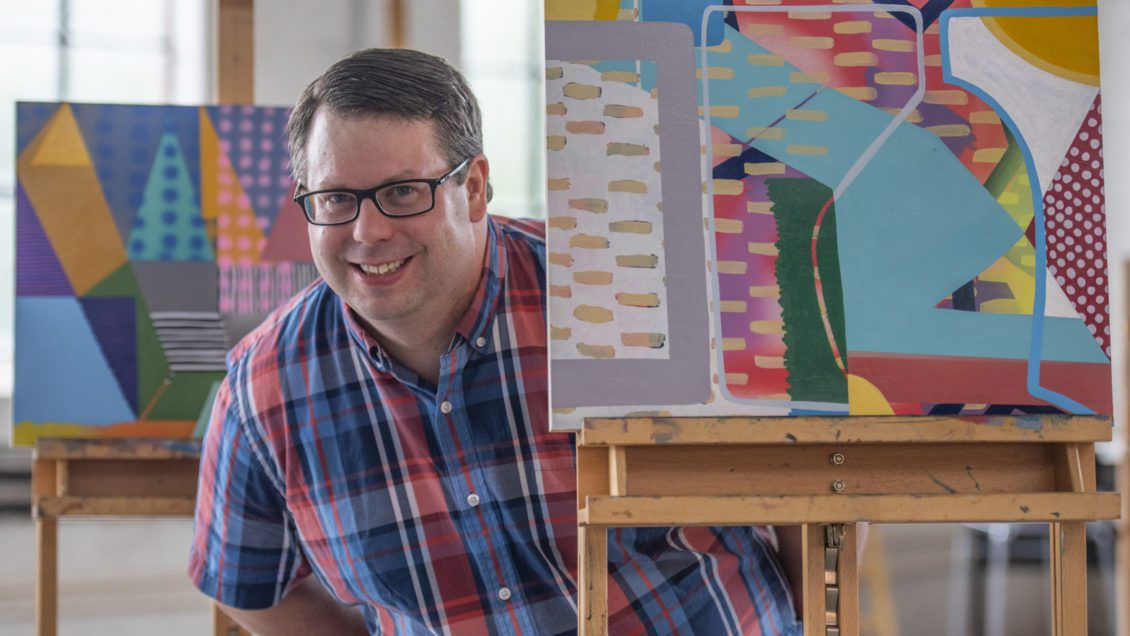CLEMSON – The call came on April 1. The voice on the other end of the line told Clemson University instructor of fine arts Mark Brosseau that he would be receiving the prestigious Pollock-Krasner Foundation (PKF) grant, a life-changing development. He wondered whether it was true.

He laughs about it now.
“All I could think was ‘Don’t call people on April Fools’ Day. Just wait a day!’”
It turns out, it wasn’t a prank. He had become the only artist in South Carolina to receive a portion of the more than $3 million grant.
“Each year the Pollock-Krasner Foundation awards funding to a select number of deserving artists, and we are excited that Mark has been recognized by a granting institution of this international caliber,” said Valerie Zimany, Chair and associate professor of art in Clemson’s College of Architecture, Arts and Humanities. “Mark has successfully integrated professional arts practices in both art studios and general education courses with critical perceptivity and good humor. We are proud of his accomplishment, as fostering new work and the development of visual artists is central to our department’s mission, and appreciate the aspirational model it establishes for our students to excel in their creative pursuits.”
The PKF award was a validation of sorts for Brosseau, for a lifetime spent following his obsession with lines, shapes, compositions and colors. Taking an artist’s path through life is not easy. It takes discipline, resilience, a complete disregard for wealth and, most of all, a bottomless love for creating.
Brosseau is the rare traveler who stuck to that path long enough to make a living at it.
“I think all art really is, is a context for looking at things,” he explained. “The thing that gets me excited about painting is that you’re creating a space – a three-dimensional space on a two-dimensional surface that’s never existed before. It’s not about a facility or a talent. That’s a lesson you can only get from studying art.”

Brosseau grew up in Vermont, with a mom who worked as a bookkeeper and a father who worked for a John Deere parts distributer. The art bug didn’t bite him when he was young. He was heavily into math and science and went to Dartmouth as a chemistry major only to discover he didn’t want to be a chemist.
“I was in my first chemistry class in this big lecture hall with like 70 kids, and I realized that sense of discovery was just gone. That thing that had really drawn me in had disappeared,” said Brosseau. “Eventually I decided I wanted to go into architecture. I had to take a drawing class to build a portfolio. As soon as I was in that class that sense of discovery came back, and that was it.”
He went on to graduate school at the University of Pennsylvania, where he received a Fulbright Scholarship in painting and printmaking in 2001. He used the scholarship to move to a ranch 30 minutes outside Reykjavik, Iceland, and paint.
“I got there a week before 9/11,” he said. “I was on my own at an old sheep farm in the middle of these lava fields that had been converted into art studios. It was a weird year.”
Brosseau met his wife Jenny, an English teacher at Greenville Middle School, online through the personal ad page on the satirical news site The Onion. They moved to the Upstate in 2016, where she could care for her ailing father and he could become a lecturer at Clemson.
Students from across all disciplines take Brosseau’s introduction to art and art appreciation classes. For some of them, figuring out how to open up their inner artist was a puzzle at first.

“I love Clemson kids — they’re really engaged,” he said. “But there was an interesting experience when I first started teaching. I’m just comfortable with doubt, it’s part of my practice, but there was a moment when I realized I was giving them this assignment that was kind of vague and they aren’t trained to be comfortable with doubt. I remember when I was that age — neither was I.”
Brosseau has learned to help his students push past their doubts and create without worrying how their work compares to others’. He says experiencing art is important for everyone, even those who would never consider themselves artists.
“Anything that can get you to look at the world in a different way, and really recognize that it’s not always the exact way you expect it to be is really important,” he said. “And anything that can get you to ask questions and deal in gray areas in a way that’s not combative or confrontational is essential. Art can do that.”
Brosseau’s colorful acrylic paintings layer lines, shapes and patterns into quilted images reminiscent of the French artist Robert Delaunay.
“I’m interested in making environments or experiential spaces,” he says. “I try to create a space that you can feel yourself inhabiting. That’s a feeling you can only get from art.”
The Pollock-Krasner Foundation Inc. was established in 1985 for the sole purpose of providing financial assistance to individual working visual artists of established ability through the generosity of the late Lee Krasner, a major abstract expressionist painter and the widow of Jackson Pollock.
The foundation reports that since its inception, it has awarded more than 4,500 grants totaling nearly $74 million to artists in 77 countries.
Get in touch and we will connect you with the author or another expert.
Or email us at news@clemson.edu

